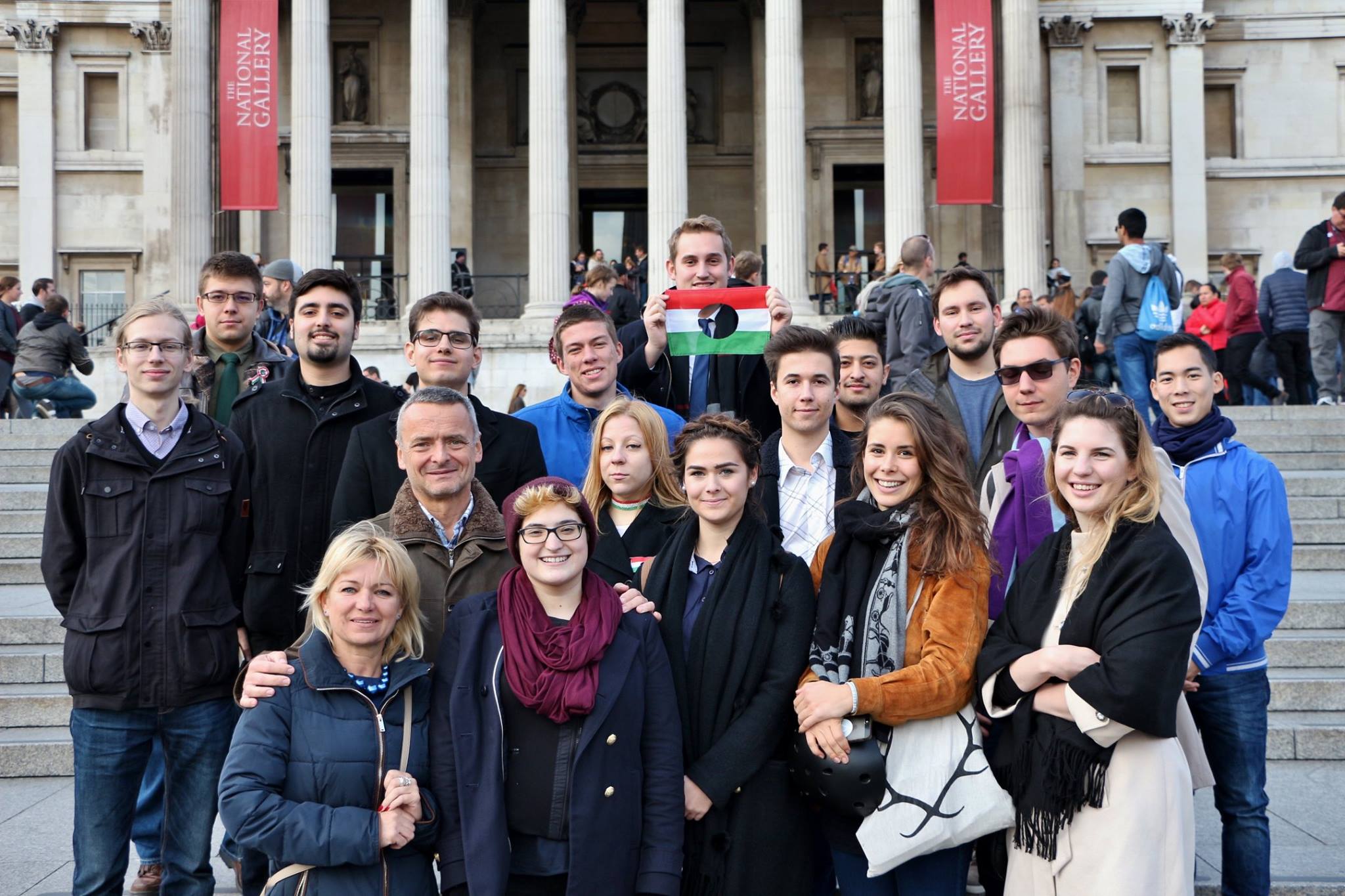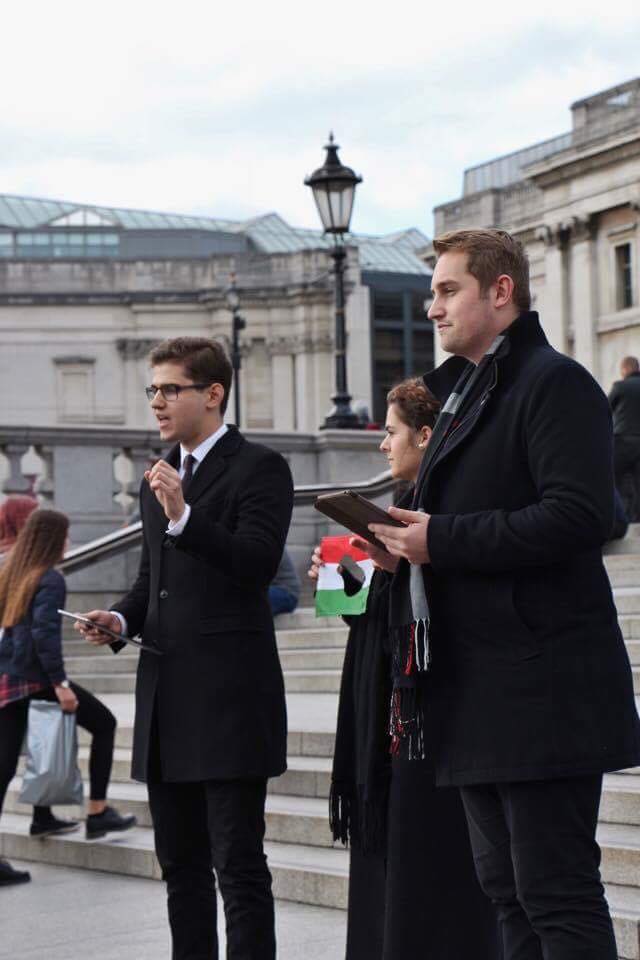
2016. október 23-án ünnepeltük az 1956-os magyar forradalom 60. évfordulóját. Párommal, Merkwart Szidóniával és barátommal, Nagy Dénes Andrással egyetértettünk abban, hogy hiába vagyunk távol a Hazánktól, de egy méltó megemlékezést szükséges tartanunk köztünk, hogy ezzel is kifejezzük tiszteletünket harcoló elődeink előtt.
A megemlékezésre London egyik központi helyét, a Trafalgar teret választottuk, ahol délután 3 órakor gyűltünk össze. A helyszín és az időpont is szimbolizálta a forradalom kezdetét, amely a budapesti Bem téren történt szintúgy 3 órakor. A felemelő megemlékezés részeként elénekeltük a Himnuszt és a Szózatot, valamint mindhárman felszólaltunk egy-egy rövid beszéddel vagy éppen a Nemzeti Dal angol változatával. Mivel számos külföldi barátunk is megtisztelt minket jelenlétével, ezért tiszteletből, illetve a téren tartózkodó emberek figyelmét felkeltve az eseményt angol nyelven tartottuk meg. A kabátokra kitűzött kokárdák és a lyukas magyar zászló 20 percre hazarepített minket valamint magyar színre változtatta a nyüzsgő teret.
Hogy azokhoz is eljusson a mondanivalónk, akik nem lehettek jelen az eseményen, ide is beillesztem a beszédeinket és a Nemzeti Dal angol fordítását, amely szerintem igen felemelő és helytálló fordítása Petőfi Sándor művének.
Merkwart Szidónia:
Dear Friends of Hungary, Thank you all for coming today to commemorate the 60th anniversary of the Hungarian Revolution in order to remember the heroic acts of our ancestors, the young and brave Hungarians who stood up against the oppression of the regime. As we are now living in freedom and we are able to express our thoughts and concerns freely, we should be deeply grateful to all Hungarian men and women who risked their lives for their children’s freedom and future. To express our gratitude to the these heroes, we will now recall the symbolic beginning of the revolution.
Nagy Dénes András:
“Egy nép azt mondta: ELÉG VOLT! - a nation said: enough. On October the 23rd, 1956, exactly at this moment 60 years ago, university students like us gathered together for a peaceful demonstration at Bem Square in Budapest, Hungary. They did so disregarding a ban on public assembly, for since 1945 Hungary was under the military occupation of the Soviet Union and since 1949 under the pressure of our occupiers and with the collaboration and assistance of traitors a one-party state, a Stalinist style communist dictatorship. On that day, the students decided to march and gather for a simple reason: they had had enough.
- They had enough of dictatorship: of censorship, the lack of a free press, of falsified accusations, unjust imprisonment, forced labor, deportation and torture to suppress free political organisation;
- They had enough of the notion that we as a people could not decide our own affairs for ourselves: the lack of fair elections and a multi-party democracy; the lack of our say in the manner of intergovernmental organisations we wish to join; and how we participate in them.
- They had enough of the foreign occupation of our country: the lie that the occupiers are here because we want them to remain; and that they will leave when we call for it. Well, we did.
A nation said loudly and clearly on October the 23rd - even though it was not allowed to say it, for free speech was illegal - ELÉG VOLT - ENOUGH.
At 3 o’clock in the afternoon, more than 20,000 protesters disregarded the ban on public assembly and gathered at Bem Square in Budapest. The symbolic significance of this event goes beyond an act of great defiance. For Bem Square in Budapest bears the name of an important hero. József Bem- or as our polish siblings call him Jozef Bem – a Polish general who fought for us in the Hungarian revolution and war of independence in 1848 against the Habsburgs who presented us with similar conditions as the Soviets did in 1956. Echoing the events which started off the revolution of 1848, a poem was read out aloud amongst the crowd. The very same poem that ignited that revolution; and what the protestors thought might ignite another in their own time.
 Tóth Máté Bence:
Tóth Máté Bence:
Sándor Petőfi, National Song.
On your feet now, Hungary calls you!
Now is the moment, nothing stalls you,
Shall we be slaves or men set free
That is the question, answer me!
By all the gods of Hungary
We hereby swear,
That we the yoke of slavery
No more shall wear.
Slaves we have been to this hour,
Our forefathers who fell from power
Fell free and lived as free men will,
On land that was their own to till,
By all the gods of Hungary
We hereby swear,
That we the yoke of slavery
No more shall wear.
Whoever now his life begrudges
Deserves his death with thieves and drudges,
For setting his own worthless hide
Above his country’s need and pride.
By all the gods of Hungary
We hereby swear,
That we the yoke of slavery
No more shall wear.
The sword shines brighter than the fetters
It is the finery of our betters,
Of slaves and fetters we grow bored.
Leap to my side, ancestral sword.
By all the gods of Hungary
We hereby swear,
That we the yoke of slavery
No more shall wear.
Magyars, once more our name and story
Shall match our ancestors’ in glory
The centuries of shame and hurt
Can now be washed away like dirt.
By all the gods of Hungary
We hereby swear,
That we the yoke of slavery
No more shall wear.
And wheresoever we may perish
Grandchildren those graves shall cherish
Singing our praises in their prayers
To thank us that our names are theirs.
By all the gods of Hungary
We hereby swear,
That we the yoke of slavery
No more shall wear.
Nagy Dénes András:
“There was another a reason why those brave Hungarian university students gathered there that day, at Bem square, in the presence of a common, Polish-Hungarian hero. It was because they wished to show solidarity with our Polish brothers and sisters; who in June 1956 engaged in what would become the Poznan uprising. Like there, the protesters calling for a better life were met with the brutal response of their own collaborationist regime. It called itself a People’s Republic but it served not interests of the people, nor was it elected by us. That is why exactly at this hour on that beautiful Sunday, the coat of arms of the hated dictatorship was cut out of the national flag: hence the hole. After the national song was read out aloud by Imre Sinkovits in 1956, the crowd did not disperse -- just like it did not in 1848. They continued on, and as evening fell, these same students marched to the state radio station and demanded that their call for change be spread throughout the country. They were refused and fired upon by the regime’s security services. Yet the students did not flee. They took up arms and fired back. By nightfall, the revolution had begun. On the next day, Soviet tanks emerged on the streets and squares of Budapest. The soldiers were told that this movement was a fascist uprising and that it had to be crushed. But when they met the students and realized that they were being lied to with regards to the intents of the protesters. They realized that they had far more in common than against. They realized that the same despicable tyrants oppressing them at home were asking them to suppress this revolution. Many said no, and disobeyed their orders. Others shamefully collaborated and fired upon the protesters. But events had spiraled out of control for the regime by then. Faced with the mutiny of Soviet soldiers, the refusal of Hungarian soldiers to fire upon their own and the united front of the citizenry standing up against the dictatorship, the regime fell. The Soviet troops withdrew. It seemed that our revolution had succeeded. But in the dark halls where the leadership of the Soviet Union and our traitorous regime gathered they came to a frightful realization: if this could happen in Hungary, it could happen elsewhere as well!
On November the 4th, 1956 the world’s largest ground force at the time, the Soviet Red Army began its invasion of Hungary. In response, barricades went up. Squares became forts, apartments bases, streets areas of combat. Students soldiers. Workers commanders. Children freedom fighters. Until November the 11th, we fought. But then our revolution was brutally crushed. To this day we do not know exactly how many of us fell in this fight for freedom. Hundreds were killed and wounded. Thousands fled and became refugees. Fearful revenge was taken by the regime: torture, imprisonment, forced labor was the fate of those who remained.
For thirty three years, from 1956 to 1989 it was forbidden to even mention our revolution at home. Yet this act of defiance, in spite of insurmountable odds was not forgotten. It inspired others as we were inspired by those who went before us. It was a chain link being broken, a part of a series of events. For together with our relatives in East Germany in 53’, through the sacrifice of the Poles of Poznan in ‘56, the brave acts of our Slovak brothers and sisters and our Czech cousins in that spring of ‘68, the overthrow of the Ceaușescu regime by our Romanian siblings in ‘89, the singing revolution that echoed in Lithuania, Latvia and Estonia ‘till 1991, We, as a family of nations brought down together the iron curtain that separated us Europeans against our will. We fought together for the same values: for freedom, liberty and independence.
Remember, remember the 23rd of October, the Hungarian revolution of ‘56, I see no reason, why this fight for freedom, should ever be forgot.
Tóth Máté Bence:
We are all standing here at Trafalgar Square as young people who have no barriers in front of their dreams and ambitions. We can now freely fight for our children’s future by expanding our knowledge at the world’s best universities and living in one of the greatest cities in the globe. We will hopefully never experience living in chains and it is utterly important to appreciate the values that our forebears fought for.
Appreciate that you can gather together for or against a notion, appreciate that your words can be heard and that you are not obliged to hold weapons to ensure the future.
Once again, thank you very much for all of you who have come here to honor our heroes. We would like to extend our heartfelt gratitude to our all non-Hungarian friends who show their solidarity with the Hungarian Freedom Fighters.

 Tóth Máté Bence:
Tóth Máté Bence: